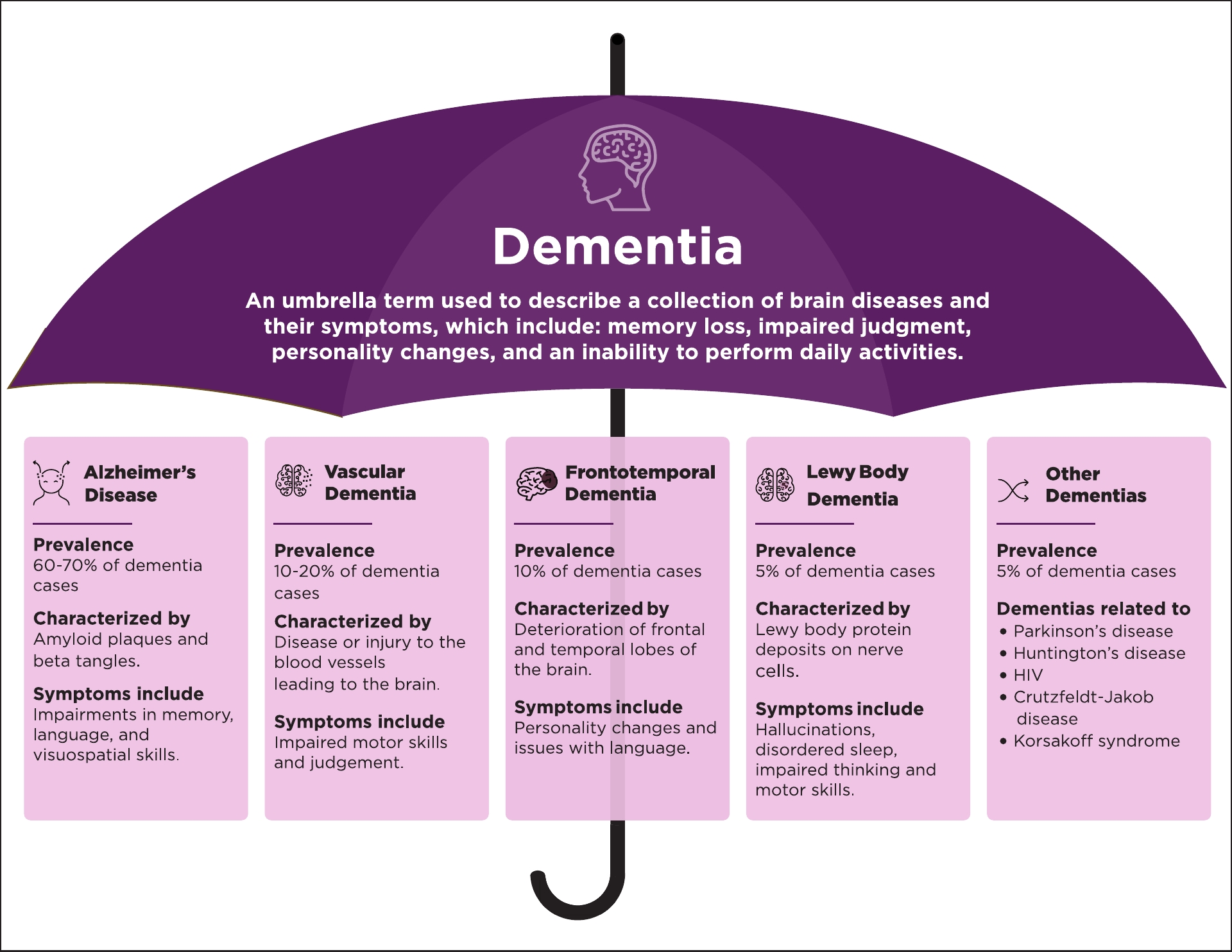Most people use the term dementia as though it refers to one specific disease, but in fact, it is an umbrella term used to describe a variety of brain diseases. What these diseases have in common is that each of them impacts a patient’s memory, cognition, and social abilities, causing disruptions to daily life and making it increasingly difficult to maintain independence. Patients recently diagnosed with dementia and their loved ones can benefit from learning the basics about its different forms and how they impact daily life, so read on to get started.
The Four Most Common Causes of Dementia
There are many brain diseases that can be classified as dementia, but 95% of cases fall into just four categories. All of them must be diagnosed by a qualified neurologist or geriatrician, as the symptoms can be difficult to differentiate and the progression of each disease is different.
1. Alzheimer’s Disease
Alzheimer’s disease is by far the most common form of dementia, accounting for up to 70% of all cases. The physical mechanism of brain damage seen with this progressive form of dementia is the formation of plaques and tangles in a patient’s brain. The plaques are actually clumps of beta-amyloid proteins, while the tangles are fibrous masses of tau proteins. These plaques and tangles damage the healthy neurons and connective fibers surrounding them, causing increasingly severe problems with memory, language, visuospatial skills, and other essential cognitive functions.
2. Vascular Dementia
Vascular dementia accounts for up to 20% of all cases. Unlike Alzheimer’s disease, its physical cause can be traced to injuries or diseases of the blood vessels leading into a patient’s brain. When these blood vessels become damaged, it increases a patient’s chances of suffering a stroke and also impacts the brain in other negative ways, including damaging the fibers of its white matter. Common symptoms of vascular dementia can include slowed thinking, loss of focus, disorganization, and problem-solving difficulties. Memory loss tends to be less noticeable in patients with vascular dementia, although it may be a minor symptom.
3. Frontotemporal Dementia
Frontotemporal dementia is characterized by the sudden or progressive breakdown of nerves and connective tissues in a patient’s frontal and temporal lobes. It accounts for around 10% of all dementia cases. Because the frontal and temporal lobes are responsible for controlling language, behavior, and personality, these are the areas of a patient’s life that are most affected. The most noticeable symptoms can include changes in behavior, affect, personality, judgment, thinking, and language, although movement disorders may also accompany frontotemporal dementia.
4. Lewy Body Dementia
Lewy bodies are abnormal clumps of protein found in the brains of some dementia patients. They are present in around five percent of all cases and cause damage to nerve cells in the brain. Common symptoms of Lewy body dementia can include visual hallucinations, sleepwalking and other forms of sleep disturbance, uncoordinated movement, tremors, and rigidity.
Other Forms of Dementia
The umbrella of dementia also encompasses many less common brain diseases, many of which can impact not just seniors but patients of all ages. While Creutzfeldt-Jakob disease and Parkinson’s disease dementia tend to occur later in a patient’s life, Huntington’s disease dementia usually causes severe declines in cognitive skills beginning between the ages of 30 and 40. Traumatic brain injuries and HIV can cause dementia symptoms at any age, as can Korsakoff’s syndrome.
Getting Help for Dementia Patients
Because all forms of dementia impact at least one aspect of a patient’s cognition, it can be difficult for those affected to find the help they need. Many dementia patients live in isolation, which can both speed the progression of the disease and create dangerous situations. Family members and friends of patients suffering from dementia should take control of the situation to ensure that their loved ones are safe.
The first step is scheduling an appointment with a neurologist or a geriatrician who can offer a definitive diagnosis. From there, take the time to learn about the specific form of dementia in question, and start looking into resources for caregiving and assisted living. Remember, most forms of dementia are degenerative, so it’s best to have a plan in place as early as possible in the progression of the disease.
Plan for the Future
Advances in modern medicine have created a situation in which dementia patients are diagnosed earlier in the progression of the diseases than ever before, which is good news for both seniors and their families. Getting an early diagnosis makes it easier to plan for the future by finding an exceptional memory care community, such as Summerfield of Roseville. Browse our website, reach out with questions, or call (916) 772-6500 to schedule a tour.

